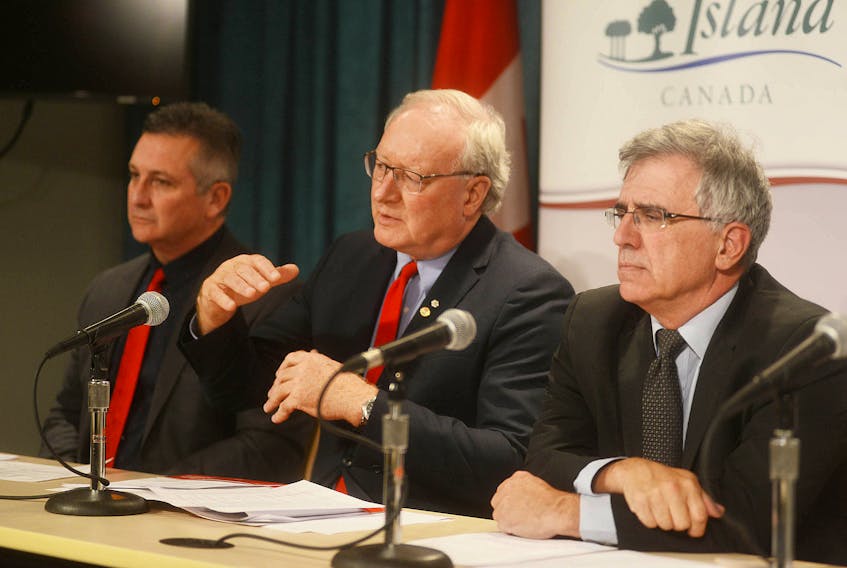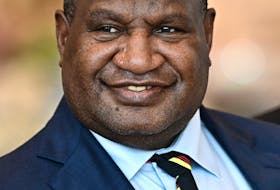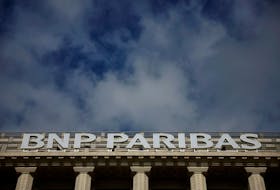CHARLOTTETOWN, P.E.I. - Prince Edward Island’s premier says the overall tax burden for Islanders under the federal government’s carbon pricing scheme will amount to an increase of one cent per litre in gas taxes.
During a press conference Tuesday afternoon, Premier Wade MacLauchlan confirmed the federal government will raise taxes on gasoline and diesel by four cents a litre starting in April 2019. But MacLauchlan said the province would offset this increase by reducing gasoline excise taxes by three cents in 2019.
In total, Islanders will see a one cent per litre tax increase on gasoline, the lowest in Canada. Home heating will be exempt from carbon taxation, which the province says will save Islanders $38.7 million in taxes. This federal-provincial deal would expire in 2020.
Without the exemption and the provincial tax reductions, MacLauchlan said the federal carbon tax plan would have imposed a $46 million tax burden on Islanders.
"Our approach throughout our climate change plan, linked to our energy plan, has been to prefer carrots over sticks, to prefer incentives over penalties," MacLauchlan said.
Earlier Tuesday, Prime Minister Justin Trudeau announced the federal government would be imposing a carbon tax on the provinces of Ontario, New Brunswick, Manitoba and Saskatchewan as a “pollution price.” The federal government said it would return the revenue collected through individual dividend cheques, ranging from $248 per household in New Brunswick to $598 per household in Saskatchewan in 2019.
"With the federal backstop being imposed in New Brunswick, electricity costs are going to go up here. There is no way that Islanders can receive a rebate like the other provinces that were mentioned today."
-Green Leader Peter Bevan-Baker
P.E.I.’s plan, which will involve the province paying for the tax cuts on gasoline, will not see residents collect a dividend cheque from the federal government.
The premier said the additional one cent per litre tax on gas will be “returned to Islanders,” but did not confirm whether this would be through program spending.
PEI’s carbon emissions (megatonnes)
- 1990: 1.9
- 2005: 2.0
- 2016: 1.8
Source: Environment Canada
Island Finance Minister Heath MacDonald said the revenue from the one cent per litre tax would be returned "in programs that will be developed, similar to the heat pump program."
MacLauchlan said the province’s Auditor General will monitor the revenues generated by the tax on a yearly basis to ensure the funds are returned.
“To be clear, this is in no way about revenue generation,” MacLauchlan said.
The premier said the province would continue to offer other incentives to reduce emissions from vehicles, which contribute the largest share of the Island’s carbon emissions. The province will continue to be eligible for the federal government’s $500-million Low Carbon Economy Fund.
Speaking in Ontario on Tuesday, Trudeau said the aim of the federal carbon tax was to ensure “it will no longer be free to pollute anywhere in Canada.”
Environment Minister Richard Brown said the federal government allowed P.E.I. to negotiate the exemption on the federal carbon tax because it recognized the leadership the Island had played in wind energy and energy efficiency programs.
“We have nothing to apologize for here on Prince Edward Island. Each and every Islander is contributing substantially to reducing greenhouse gases,” Brown said.
The province’s carbon tax plan was finalized over the weekend after a meeting of the Liberal caucus Sunday afternoon and a cabinet meeting Monday.

P.E.I. Green Leader Peter Bevan-Baker said the Island’s plan may result in higher electricity prices.
"With the federal backstop being imposed in New Brunswick, electricity costs are going to go up here,” he said. “There is no way that Islanders can receive a rebate like the other provinces that were mentioned today."
Bevan-Baker said the goal of carbon pricing, which economists say is meant to reduce spending on carbon-intensive fuels, was largely compromised by the province’s tax reductions on fuel.
He estimated the province could spend up to $9 million in 2019 alone to pay for the tax cuts.
"This is not going to reduce emissions. It's not going to benefit everyday Islanders, and it's actually going to cost the province overall," he said.
A report produced by the UN’s Inter-governmental Panel on Climate Change earlier this month warned that governments had only 12 years to reduce greenhouse gas emissions urged leaders to set a global price on carbon emissions.
The Guardian reached out to the PC Party for comment but did not hear back by deadline.
Related: Federal carbon tax rebates will exceed the cost for most people affected









